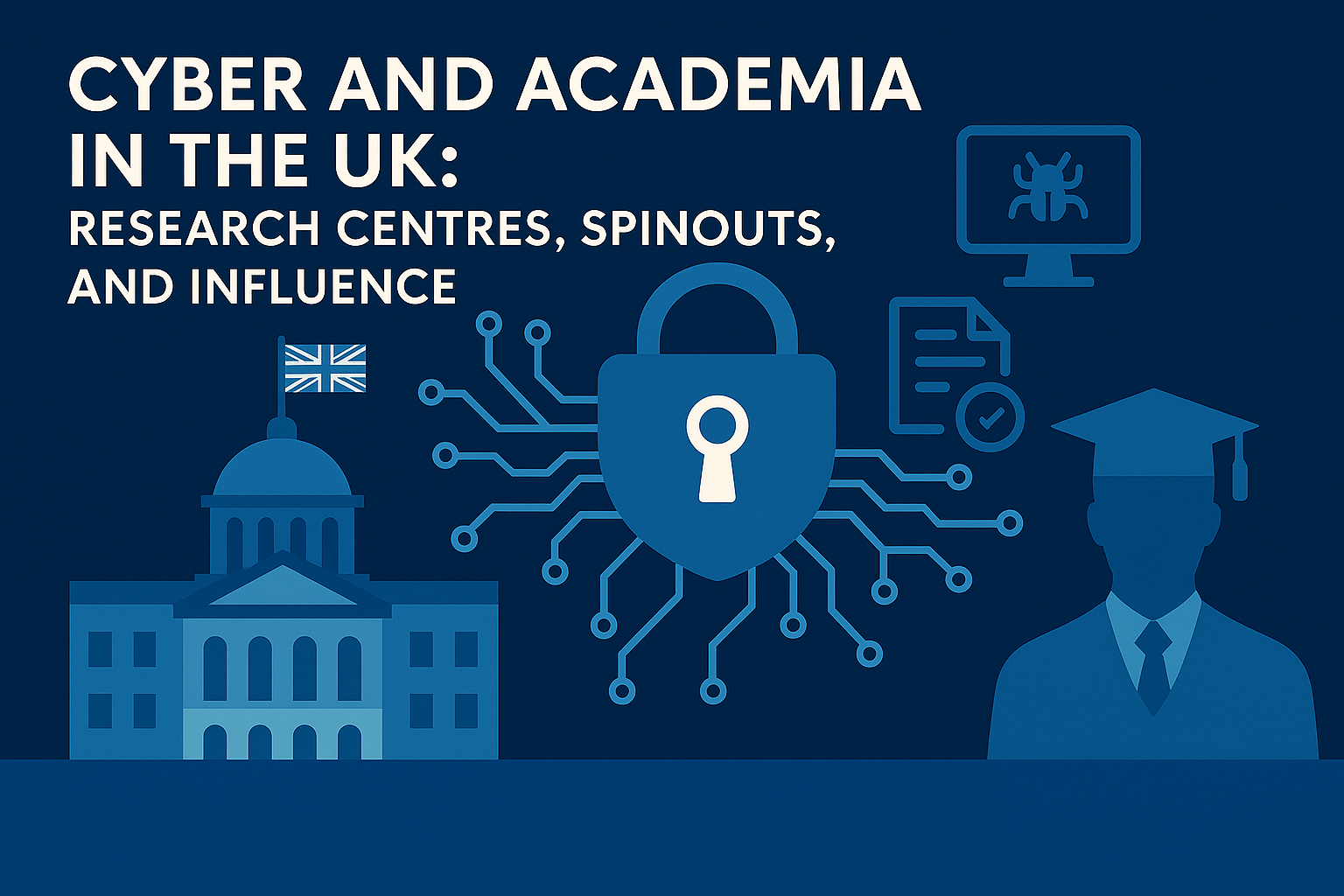The UK’s academic institutions play a foundational role in shaping the country’s cybersecurity ecosystem. They don’t just educate the workforce, they produce world-class research, support government policy, commercialise IP into high-growth spinouts, and influence standards through international collaboration.
From GCHQ-accredited centres to entrepreneurial labs… how UK universities shape cybersecurity policy, talent, and innovation.
This article explores the key universities, research centres, academic programmes, and cyber spinouts that make UK academia one of the most respected and impactful ecosystems in global cybersecurity.
Contents
- Contents
- 1. GCHQ/NCSC-Accredited Academic Centres of Excellence
- 2. Notable Research Hubs and Specialisms
- 3. UK Cyber Spinouts and Commercialisation Successes
- 4. Government & Industry Partnerships with Academia
- 5. Key Academic Influencers and Thought Leaders
- 6. How to Engage with UK Academic Cyber Ecosystems
- 7. The Role of Academia in UK Cyber Policy
- Final Thoughts
- References
1. GCHQ/NCSC-Accredited Academic Centres of Excellence
The National Cyber Security Centre (NCSC) designates two core types of Academic Centres of Excellence (ACEs):
Academic Centres of Excellence in Cyber Security Research (ACE-CSRs)
These institutions conduct world-leading research in cybersecurity. As of the latest designation, notable ACE-CSRs include:
- University of Oxford – Oxford Cyber Security Centre
Focus: Privacy, cryptography, socio-technical systems - University of Cambridge – Computer Laboratory
Focus: Systems security, hardware roots of trust, and verification - University of Bristol
Focus: Secure hardware, communications, and quantum computing - Royal Holloway, University of London
Longstanding reputation in cryptography and cyber law
Academic Centres of Excellence in Cyber Security Education (ACE-CSEs)
These universities deliver high-quality cyber education and skills programmes. Examples include:
- University of Warwick
Combines technical training with strategic cyber leadership programmes - Lancaster University
Noted for multidisciplinary approaches to human-centred cybersecurity - University of Southampton
Strong in software security and maritime cyber
Why it matters: These centres help shape UK cyber policy, receive targeted funding, and often support national capability development.
Link: https://www.ncsc.gov.uk/information/academic-centres-of-excellence-in-cyber-security-research
2. Notable Research Hubs and Specialisms
Beyond ACE-accredited institutions, several UK universities have become recognised for excellence in specific cyber domains:
- University of Birmingham – Hardware security and post-quantum cryptography
- University of Strathclyde – Industrial control systems (ICS) and critical infrastructure cyber
- Queen’s University Belfast (QUB) – The Centre for Secure Information Technologies (CSIT); strong links to UK government and startups
- University College London (UCL) – Privacy-enhancing technologies and AI-security
- De Montfort University – One of the first UK institutions to offer dedicated cyber degrees; applied security research focus
- University of Kent – Institute of Cyber Security for Society (iCSS) – Cross-cutting themes across law, policy, and technology
3. UK Cyber Spinouts and Commercialisation Successes
UK universities have helped birth several significant cyber startups:
- CyberOwl (QUB spinout) – Risk monitoring for operational technology and maritime
- Risk Ledger (UCL origin) – Supply chain security platform
- Garrison (spinout of government and defence research collaborations) – Secure remote browsing
- Panaseer (research-inspired enterprise from London universities) – Continuous control monitoring for cyber risk
- Awen Collective (University of South Wales/innovation partnerships) – Industrial cybersecurity tools
Why it matters: These spinouts often gain early traction via NCSC programmes, CyberASAP, or Innovate UK funding, and become embedded in national and international supply chains.
4. Government & Industry Partnerships with Academia
UK academia doesn’t operate in isolation; it’s woven into public and private sector delivery:
- CyberASAP – Funded by DSIT and delivered by Innovate UK, this programme supports researchers in commercialising cyber research
- Knowledge Transfer Partnerships (KTPs) – Allow companies to embed researchers into cyber product development
- EPSRC & UKRI funding streams – Drive long-term cyber R&D on topics like AI assurance, quantum-safe algorithms, and autonomous system security
- NCSC Industry 100 – Includes academic placements to influence real-world guidance
5. Key Academic Influencers and Thought Leaders
UK cyber academia is home to globally respected voices shaping cyber discourse:
- Prof. Angela Sasse (UCL) – Leading thinker in usable security and human factors
- Prof. Mark Ryan (University of Birmingham) – Cryptography and systems security
- Dr. Lydia Kostopoulos (affiliated internationally, UK-linked research) – AI and digital ethics
- Prof. Andrew Martin (University of Oxford) – Systems trust and security-by-design
- Dr. Jose Such (King’s College London) – AI explainability and human-centred security
6. How to Engage with UK Academic Cyber Ecosystems
- Collaborate via CyberASAP – For industry access to pre-commercial IP
- Sponsor MSc or PhD projects – Gain early access to talent and applied research
- Join advisory boards – Many centres welcome input from practitioners
- Attend conferences – Look out for CyberUK, Academic Centres of Excellence conferences, and CRESTCon
- Tap university networks – Many have innovation hubs and accelerators (e.g. SETsquared, Midlands Innovation, Oxford Foundry)
7. The Role of Academia in UK Cyber Policy
Academia is deeply embedded in UK cyber governance:
- NCSC frequently cites UK academic research in its guidance
- UK Cyber Security Council draws on university input for certification and standards
- Parliamentary evidence on AI and cyber often comes from leading professors
- Policy-influencing think tanks (e.g. RUSI, Chatham House) often partner with academics for credibility
Final Thoughts
UK academia is a strategic pillar of national cybersecurity, producing research, shaping minds, and launching the next generation of cyber innovation. It operates across technical domains, policy development, and commercialisation, often acting as a bridge between sectors.
If you’re looking to shape the future of cybersecurity through partnership, research, policy, or product, start with the UK’s cyber universities. They don’t just think differently. They help the country lead securely.
References
- Inside the UK Cyber Ecosystem: A Strategic Guide in 26 Parts
- The Insider’s Guide to Influencing Senior Tech and Cybersecurity Leaders in the UK
- Cyber and Academia in the UK: Research Centres, Spinouts, and Influence
- UK Cyber Skills Landscape: The Real Gatekeepers of Talent and Training
- From Startups to Scaleups: The UK’s Cyber Commercialisation Ladder, Explained
